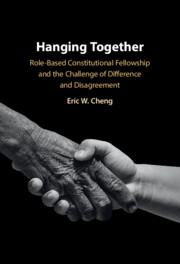 Hanging Together
Hanging Together Book contents
- Hanging Together
- Hanging Together
- Copyright page
- Contents
- Acknowledgments
- 1 Introduction
- 2 Aiming Too High, Aiming Too Low
- 3 Fellowship’s Forefather
- 4 Broadening the Base
- 5 Three Dimensions of Trust
- 6 Principled Pragmatists, Principled Purists, and the Liberal Democratic Front
- 7 Talking, Shouting Back, and Listening Better
- 8 Justifying (and Constraining) Salutary Hypocrisy
- 9 Facilitating Fellowship
- 10 Conclusion
- Index
3 - Fellowship’s Forefather
Moving beyond Aristotelian Political Friendship
Published online by Cambridge University Press: 07 July 2022
- Hanging Together
- Hanging Together
- Copyright page
- Contents
- Acknowledgments
- 1 Introduction
- 2 Aiming Too High, Aiming Too Low
- 3 Fellowship’s Forefather
- 4 Broadening the Base
- 5 Three Dimensions of Trust
- 6 Principled Pragmatists, Principled Purists, and the Liberal Democratic Front
- 7 Talking, Shouting Back, and Listening Better
- 8 Justifying (and Constraining) Salutary Hypocrisy
- 9 Facilitating Fellowship
- 10 Conclusion
- Index
Summary
Chapter 2 concluded that liberal democracy must be supported by a sense of unity that is oriented toward the preservation of liberal democracy and that does not suppress difference and disagreement. Chapter 3 explores what this unity ought to look like by engaging with Aristotle’s notion of political friendship. For Aristotle, citizens who belong to different factions are political friends when they share a commitment to preserve the regime, provided that the regime is “correct” or not excessively “deviant.” The chapter determines that the unity we seek should assume the form of a culture of trust where citizens believe that their fellow citizens probably value the continuation of their civic relationship, where citizens share a commitment to liberal democracy, and where they can nonetheless debate the meaning of equality and justice. Such trust, however, faces an initiation problem by virtue of presupposing a broad commitment to liberal democracy. This chapter concludes that citizens must either first develop a preliminary sense of trust on top of something other than a commitment to liberal democracy or be able to contribute to liberal democratic trust without realizing it.
Keywords
- Type
- Chapter
- Information
- Hanging TogetherRole-Based Constitutional Fellowship and the Challenge of Difference and Disagreement, pp. 47 - 63Publisher: Cambridge University PressPrint publication year: 2022
